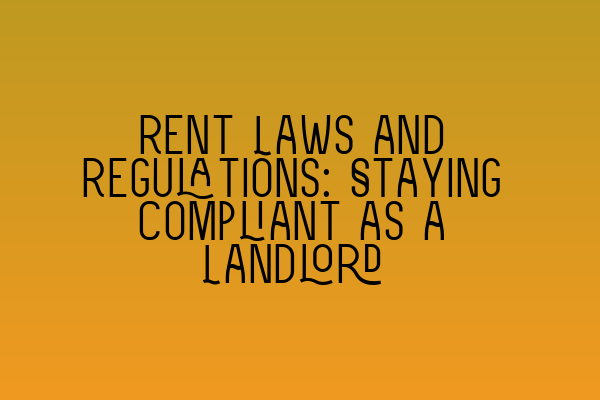Rent Laws and Regulations: Staying Compliant as a Landlord
As a landlord, it is essential to understand and comply with the various rent laws and regulations in your jurisdiction. Failure to do so can result in legal issues, fines, and damage to your reputation. In this blog post, we will discuss important considerations for landlords to ensure compliance and maintain a positive landlord-tenant relationship.
1. Know Your Local Rent Laws
Every locality has specific rent laws and regulations that govern the landlord-tenant relationship. It is crucial to familiarize yourself with these laws to prevent any inadvertent violations.
Some common areas covered by rent laws include rent increases, security deposits, eviction processes, and tenant rights. By understanding and following these laws, you can avoid costly legal disputes and maintain a good relationship with your tenants.
2. Keep Updated Documentation
Maintaining accurate and up-to-date documentation is essential for landlords. This includes rental agreements, tenancy contracts, and any addendums or amendments. These documents protect your rights as a landlord and provide a clear understanding of the terms and conditions agreed upon by both parties.
Regularly reviewing and updating your documentation ensures that you are in compliance with current rent laws and regulations. It is also crucial to provide your tenants with copies of all relevant documents for their reference.
3. Handle Security Deposits Appropriately
Security deposits are a standard requirement when renting a property. As a landlord, you must handle these deposits appropriately and in accordance with your local laws.
Typically, you are required to hold the security deposit in a separate bank account and provide your tenants with a written receipt. When the tenancy ends, you must return the deposit within a specified timeframe, minus any deductions for damages or unpaid rent.
Understanding and following the regulations regarding security deposits will protect both you and your tenants from unnecessary disputes.
4. Be Mindful of Rent Increases
Rent increases must be approached with care and within the bounds of your local rent laws. Before raising the rent, ensure that you are following the proper notice periods and limits set by your jurisdiction.
For example, some areas may require a 30-day notice before raising the rent, while others may have stricter guidelines. By adhering to these requirements, you can avoid potential legal issues and maintain a fair and transparent rental process.
5. Familiarize Yourself with Eviction Processes
No landlord wants to go through the eviction process, but it is sometimes necessary to protect your property and rights. Understanding the eviction process outlined in your local rent laws is vital for ensuring a smooth and lawful procedure.
Take the time to familiarize yourself with the specific notice periods, the lawful reasons for eviction, and the proper procedures for serving eviction notices. Additionally, be aware of any special circumstances, such as eviction protections for certain groups.
6. Seek Legal Advice When Needed
While it is important to stay informed about rent laws and regulations, it can be challenging to navigate the legal complexities on your own. When in doubt, it is wise to seek legal advice from a qualified professional who specializes in property law.
A property solicitor experienced in rent laws can provide valuable insights and guidance specific to your situation. They can help you understand the intricacies of your local laws, review your documentation, and ensure that you are in compliance with all necessary regulations.
Remember, staying compliant with rent laws is not only legally required but also essential for maintaining a positive and successful landlord-tenant relationship. By following these guidelines and seeking professional advice when needed, you can navigate the complex landscape of rent laws and regulations with confidence and peace of mind.
For more information and resources on SQE (Solicitors Qualifying Examination) preparation, you can check out the following related articles:
- SQE 1 Practice Exam Questions
- SQE 1 Practice Mocks FLK1 FLK2
- SQE 2 Preparation Courses
- SQE 1 Preparation Courses
- SRA SQE Exam Dates
Remember, compliance with rent laws is crucial for landlords to avoid legal issues and maintain a positive landlord-tenant relationship. Stay informed, update your documentation, and seek professional advice when necessary to ensure a smooth and successful rental experience.
